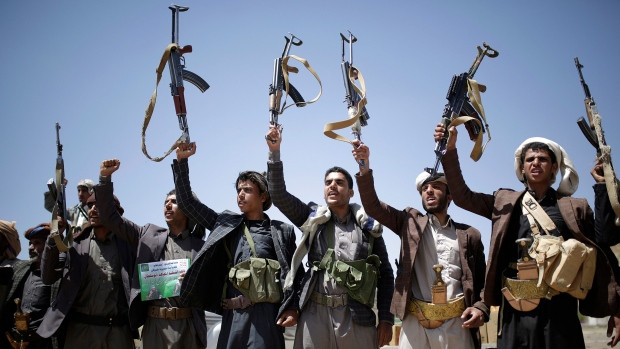
SANAA, Nov. 19 (Saba) - The Yemen war is historic as it exposed Saudi Arabia’s national and geopolitical weaknesses. Besides the big holes in its defense strategy, Saudi Arabia has found itself vulnerable on an unprecedented level.
A Saudi official admitted for the first time since 2016 that Riyadh is in talks with the Houthi . The talks have surfaced despite the Houthis being in charge of the capital Sanaa and the other most populous parts in Northern Yemen, which indicates that the Saudis are coming to terms with this status quo.
After signing the Riyadh power-sharing agreement between the separatist Southern Transitional Council and the UN-recognized government in Aden, Saudi Arabia and the UAE seem to be ready to move on to the next phase of their gouty war in Yemen.
Since the September attack on Saudi oil facilities, Riyadh has taken a step back from all-out war. All parties, including the United States, should seize this rare opportunity to resolve the conflict.
The Saudis are quite right to adopt this strategic shift in their policy. After almost five years of war, which resulted in more than 100,000 victims, the worst humanitarian crisis in the world, and has damaged the country’s image on the world stage, a change was desperately needed.
But these are not the only catalysts behind this change.
The attack on the Saudi Aramco oil installations in September, which knocked out half of the Kingdom’s production, was a tipping point.
Somewhat surprisingly, the Saudi response to Houthi overtures has been mostly positive. They have not suspended airstrikes but have reportedly reduced them in some areas.
They have facilitated the entry of a number of fuel shipments into Houthi-controlled territory, albeit not enough to address the ongoing fuel crisis. The Houthis unilaterally released almost 300 prisoners, including three Saudis. Both sides have exchanged unusually positive public signals indicating interest in de-escalation, and they have reportedly reopened back-channel discussions.
It tests and uncovers the kingdom’s military vulnerabilities , and there are no easy military options for turning the tide against the Houthis. After the United Nations prevented an attack on the Houthi-held port city of Hodeida in December 2018, Saudi Arabia’s main coalition partner, the UAE, redeployed its forces and now sees little point in continuing the effectively stalemated war in the north.
The political stars are aligning in a way that offers an offramp from a war that has caused immeasurable humanitarian damage and threatens to become a trigger for a regional conflagration.
This opportunity should be embraced, particularly by the United States, which has been complicit in Riyadh’s war and could now encourage its Saudi allies to reach an understanding with the Houthis that includes significant reductions in cross-border attacks.
The kingdom has also faced a growing backlash against its role in the Yemen war, including from the U.S. Congress.
The current talks focus on interim goals, such as re-opening Yemen's main international airport in Sanaa, shut down by the Saudi-led coalition in 2016. Also under discussion is a buffer zone along the Yemen-Saudi border in areas under Houthi control.
Abu Bakr al-Qirbi, a former Yemeni foreign minister, told the AP from Oman that the Saudis' main concerns include dismantling the Houthis ballistic and drone capabilities and the kingdom's border security.
The Saudis are looking for assurances the Houthis will distance themselves from military power
These talks could pave the way for more high-profile negotiations early next monthes, said one of the Houthi officials.
The recent rapprochement - if materialized - could put an end to a war that has killed over 100,000 people, destroyed Yemen's infrastructure, displaced millions, and pushed the country's 30 million people into one of the world's worst humanitarian crises.
However, it remains to be seen how future peace talks could shape a post-war Yemen, deeply fragmented along many fault lines during the conflict.
A senior Saudi official told a group of reporters in Washington that, “there is a sense that we need to move to resolution of this conflict.” He said the ongoing talks are also focusing on prisoner exchanges between the warring sides.
There are signs all involved in the fighting are seeking a way out. The United Arab Emirates, a member of the Saudi-led coalition, has tried to extricate itself from the conflict and said it was pulling out of Yemen, after spending years financing and training militias and separatist political factions in southern Yemen.
Saudi Arabia (and most of the other smaller Gulf nations) have now been taken hostage in this fight. It is quite fair to say that the Saudis and their allies in the UAE have been left completely alone to stand up to Yemeni people. Officials in the two countries feel extremely exposed due to Trump’s failure to assert any solid security guarantees from the US.
The Arab community as a whole seems to be out of sight, and there is no appetite, in countries like Egypt, for example, to throw their weight behind some Arab fraternity against the “Persian hegemony,'' as many in the Gulf like to call it.
The results look grim. The misery of the Arab world, under the hypothetical Saudi leadership, recalls the sick man of Europe doomsdays of the Ottoman Empire.
the Saudis are moving alone into uncharted waters in Yemen
While reality doesn’t offer Saudi officials much, all they can do for now is to stop bombing the Houthis, accelerate talks with them over future political integration – as well as relinquishing their heavy weapons and border security.
Written by Mona Zaid